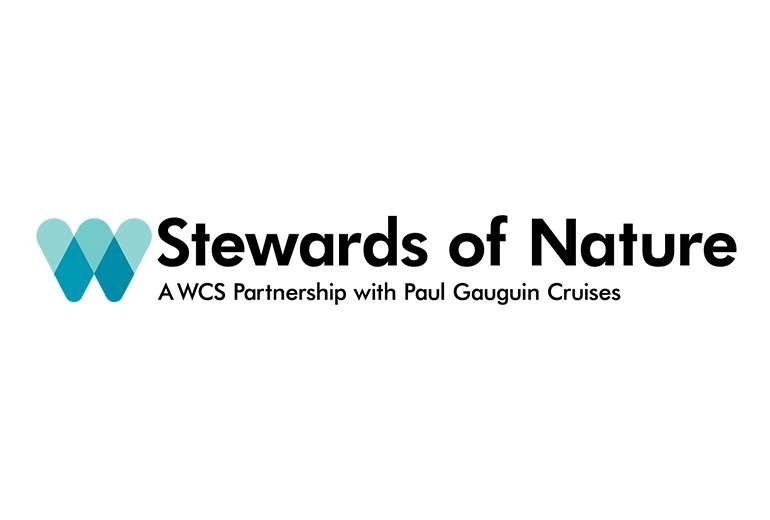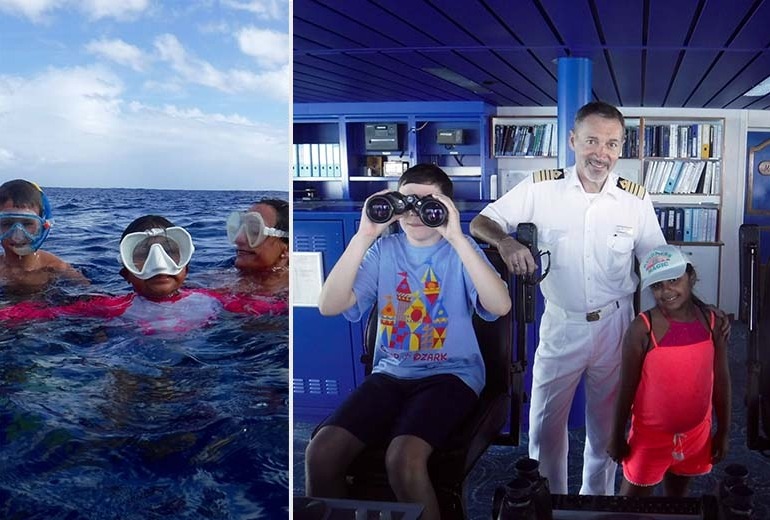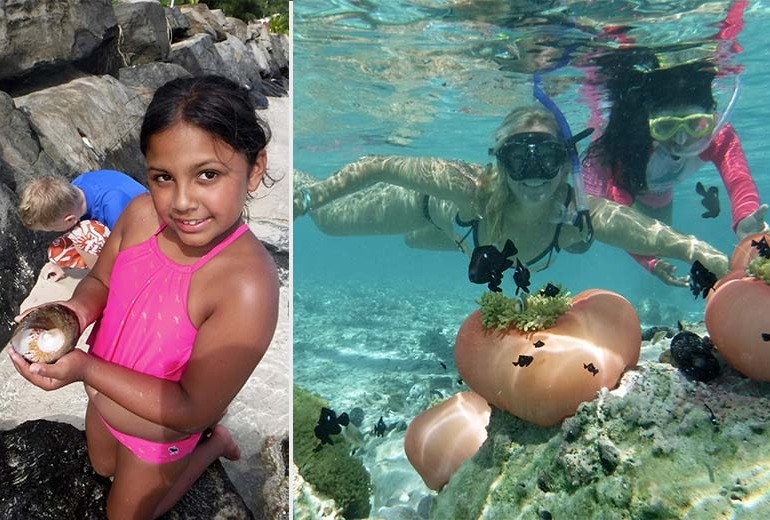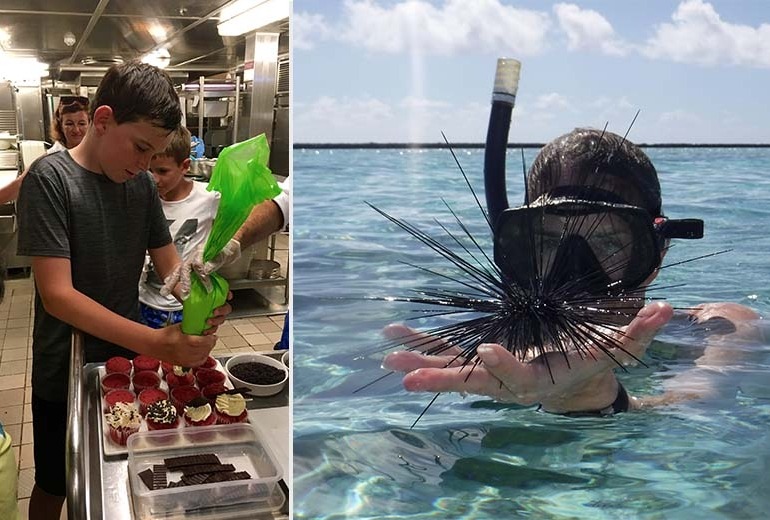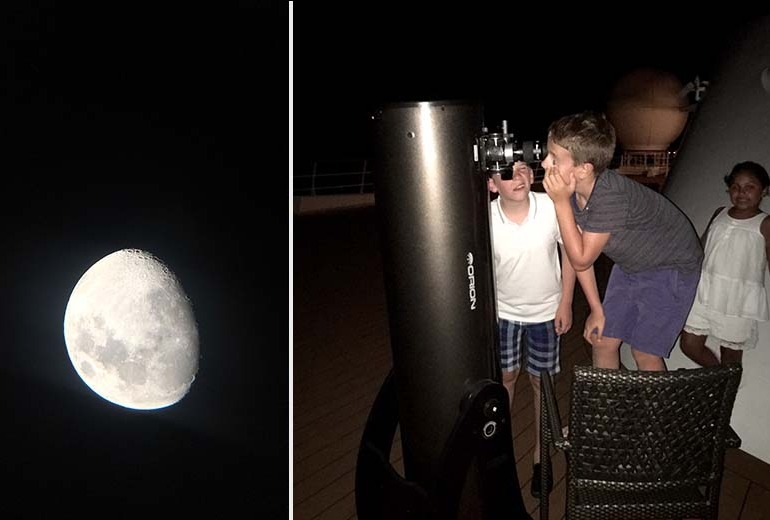Meet Our Stewards of Nature Naturalists
Blog
Meet Our Stewards of Nature Naturalists
The Stewards of Nature is a unique program, offered jointly by Paul Gauguin Cruises and the Wildlife Conservation Society, that invites children and teens (ages 7-17), as well as family members, to discover and value nature through hands-on, interactive learning. Leading the program aboard summer and holiday sailings of the m/s Paul Gauguin are naturalists Megan Saylor and Meredith Kintzing. In this Q&A, they share their backgrounds and their experiences with the launch of the program.
PGC: What exactly is a naturalist and what does a naturalist do?
Megan: The goal of a naturalist is to generate interest in the environment and natural world by sharing their expertise and knowledge with the general public in a relatable and often inspiring way. This often includes lectures, nature walks, and other hands-on environmental education activities.
Meredith: A naturalist studies the natural world (animals, plants, habitats, etc.) and how organisms interact in their natural environments. Naturalists are different from other scientists because they do most of their work outside, making observations and looking for patterns, while many other scientists do experiments in laboratories.
PGC: What attracted you to this field?
Megan: This is my first job opportunity as a naturalist, but I have been in the marine science field for the past ten years. This job is especially attractive because not only do you get to share your knowledge on the topics you are most passionate about, but most of the time you get to travel to really unique places to teach people about them! It is the very best of both worlds!
Meredith: I have always loved being outside observing the plants and animals around me. I went to college knowing that I wanted to major in Biology but thinking I wanted to be a physician. However, I had the opportunity to intern in a marine biology lab for one of my professors. On the first day, we collected algae (seaweed), and I was amazed at how many different little critters used the algae as a home. I knew if I could be that happy surrounded by little “bugs,” I had found my calling. I feel a little like Moana, with the ocean calling to me. But where she wants to explore the surface and find new islands, I want to explore underwater and learn about all the amazing creatures that live there.
PGC: What kind of training is required?
Megan: Naturalists must not only be proficient and confident in the topics they are to discuss on the ship, but also in their ability to communicate these sometimes challenging subject matters to the public—and even further, to children. Training usually involves learning the subject matter both forwards and backwards. Your job is to be a resource of knowledge!
Meredith: Anyone can be a naturalist. All you need is curiosity and a love of the outdoors. However, to work as a naturalist, you need to demonstrate expertise in some aspect of the natural world. In my case, I have a PhD in Ecology I earned while studying coral reef communities.
PGC: What is your favorite aspect of nature to explore?
Megan: As a marine biologist, my favorite aspect of nature to explore is hands-down the ocean! I love all parts of the ocean, both flora and fauna included. But if I had to pick my favorite topic it would be marine mammals.
Meredith: I love the ocean, particularly coral reefs. They are so beautiful and home to so many other organisms. It is amazing that coral reefs have been created over thousands of years by some of what we consider to be the most simplistic organisms. I also think invertebrates are really cool because they are so diverse. Fakarava was one of my favorite places to visit because we could compare the organisms we found in the tide pool on one side of the island to the organisms on the reef on the other side of the island.
PGC: What are some of your favorite Stewards of Nature activities?
Megan: Being a marine mammal enthusiast, my favorite Stewards of Nature activity is the whale-watching/marine mammal day. I absolutely love teaching people of all ages about these amazingly intelligent and charismatic ocean megafauna. I also really enjoy the star-gazing. It was so much fun to learn about the sky in the Southern Hemisphere and how ancient French Polynesians relied on the stars to navigate—truly fascinating!
Meredith: When talking with the Stewards of Nature, I would tell them every day was my favorite because we have so many fun activities. A few of my most favorite activities are the shark and ray snorkel in Bora Bora, dolphin and whale watching in Moorea, snorkeling at Motu Mahana, and finding invertebrates in tide pools on Fakarava.
PGC: What are some of the kids’/teens’ favorite activities?
Megan: The kids really seem to enjoy the shark snorkel in Bora Bora. This continued to be a top hit for them. A lot of the Stewards also seemed to enjoy the bridge and galley tour on the ship.
Meredith: The Stewards of Nature seem to really enjoy all of the activities where we are outside exploring. Everyone really enjoyed snorkeling at Motu Mahana, the shark and ray excursion, and dolphin and whale watching, as well as our trip to the sea turtle rehabilitation clinic Te Mana o Te Moana. Additionally, the kids seemed to enjoy hermit crab races on the Motus, the pizza and ice cream parties, and movie night. Making sun prints with Nana Gregory was also really popular.
PGC: How do you keep kids/teens of such a wide age range involved and engaged?
Megan: As naturalists, we like to really get to know the kids in the group—not just their names, but their special interests and any questions they may have. That way, we can tailor the program to their specific interests. This creates a very personalized experience for each individual participant and really engages them in the program.
Meredith: We try to keep all the activities and lessons really fun. We play lots of games, and a lot of the activities we do, like snorkeling, are popular with people of all ages, even adults.
PGC: What kind of involvement is there with the parents?
Megan: The parents are involved as much or as little as they would like to be. Some parents chose to participate in almost all of our activities, and some did not participate at all. It is entirely up to what the family wants, and I think parents really like the flexibility incorporated in the program.
Meredith: The parents are welcome to join us for any of our activities, and so we have a wide range of involvement. The parents seemed most to enjoy the shark and ray snorkel in Bora Bora and the dolphin and whale watching in Moorea. Ocean trivia night and the group dinner night were also popular and had a lot of parental participation.
PGC: What are some of the reactions you’ve received so far about the program?
Megan: We have received nothing but rave reviews from the kids, parents, and fellow cruise-goers alike. It has been an amazing experience to get to know all of these wonderful families, and we are so happy that they are as pleased with the program as we are.
Meredith: All of the feedback we have received has been positive. The Stewards of Nature and their parents really seemed to enjoy and value the program. The kids all had a lot of fun, and the parents were pleased that the kids were happy and also learned a lot.
PGC: What do you most want people to take away from the Stewards of Nature program?
Megan: I hope that the Stewards are able to take away a little bit of everything from this experience. Our hopes are that this program will not only be educational, but engaging and fun! We want to inspire kids to care about the world they live in by showing them firsthand just how beautiful and amazing it actually is!
Meredith: My hope is that all of our Stewards have a fun time learning about nature in a scientific way. We try to emphasize using the scientific method to observe nature while also instilling an appreciation and respect for the environment and all the living creatures we observe. I think this program is a great way to get kids excited about learning in general, but also to get them more excited about nature and science in particular.
PGC: Do you work as a naturalist when you’re not aboard the m/s Paul Gauguin? What kind of work do you do?
Megan: For the past six years, I have worked as a dolphin trainer for the US Navy’s Marine Mammal Program. Prior to this position, I have gained educational experience at several zoos and aquariums on the eastern coast.
Meredith: When not working on The Gauguin, I am an Associate Professor of Biology and Environmental Science at Northern Virginia Community College’s Alexandria campus. In my classes, I try to inspire the adults I teach to better understand and appreciate science and nature. Even when not working as a naturalist, I do try to get out to study and enjoy nature.
PGC: What kinds of hobbies or recreational activities do you enjoy?
Megan: I love any activity involving the outdoors, whether it’s hiking, swimming, or rock climbing—anything that gets me outside.
Meredith: I love being outside and being active. Running, swimming, biking, soccer, and SCUBA diving are among some of my favorite activities. I enjoy watching sports, too, and am a huge football and college basketball fan. And when not watching or participating in some sort of sport, nothing is better than curling up with a good book.
PGC: Anything you want to add?
Megan: Being a naturalist has been a wonderful experience for me. I have truly enjoyed sharing my passion for conservation with others and helping them understand why it is so important to nurture and protect our Earth!
Meredith: The Gauguin is an incredible ship, with an amazing crew, that visits many beautiful locations throughout French Polynesia and the Cook Islands. The Stewards of Nature program, offered exclusively on The Gauguin, is really unique. We are able to teach kids about science and nature in an immersive way in some of the most beautiful and majestic environments in the world, hopefully creating memories and a respect for nature that last a lifetime. I feel really fortunate to be able to be part of such a special program.
For more information about the Stewards of Nature program, click here.
Latest Posts
Older Posts
- September 2021 (1)
- July 2021 (1)
- June 2021 (1)
- April 2021 (1)
- March 2021 (1)
- January 2021 (1)
- December 2020 (1)
- October 2020 (1)
- September 2020 (1)
- July 2020 (1)
- June 2020 (2)
- March 2020 (1)
- February 2020 (1)
- January 2020 (1)
- December 2019 (2)
- November 2019 (1)
- October 2019 (2)
- September 2019 (1)
- August 2019 (1)
- July 2019 (1)
- May 2019 (1)
- April 2019 (1)
- March 2019 (1)
- February 2019 (1)
- January 2019 (1)
- December 2018 (1)
- November 2018 (1)
- October 2018 (1)
- September 2018 (1)
- August 2018 (1)
- June 2018 (1)
- May 2018 (1)
- April 2018 (1)
- March 2018 (1)
- February 2018 (1)
- January 2018 (1)
- December 2017 (1)
- November 2017 (1)
- October 2017 (1)
- September 2017 (1)
- July 2017 (1)
- June 2017 (2)
- May 2017 (1)
- April 2017 (3)
- March 2017 (1)
- February 2017 (1)
- January 2017 (1)
- December 2016 (1)
- October 2016 (1)
- September 2016 (2)
- August 2016 (1)
- July 2016 (2)
- May 2016 (1)
- April 2016 (2)
- March 2016 (1)
- February 2016 (1)
- December 2015 (3)
- November 2015 (2)
- August 2015 (1)
- July 2015 (1)
- June 2015 (1)
- May 2015 (2)
- December 2014 (1)
- October 2014 (1)
- August 2014 (1)
- May 2014 (1)
- April 2014 (1)
- January 2014 (1)
- December 2013 (1)
- November 2013 (2)
- October 2013 (2)
- August 2013 (7)
- July 2013 (1)
- June 2013 (1)
- April 2013 (1)
- March 2013 (1)
- January 2013 (2)
- December 2012 (2)
- November 2012 (1)
- October 2012 (2)
- August 2012 (2)
